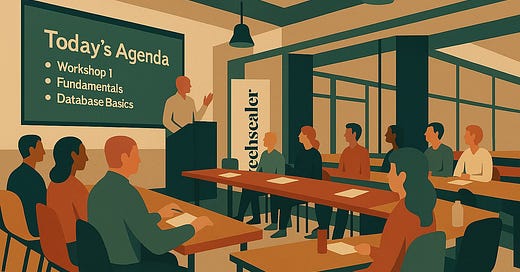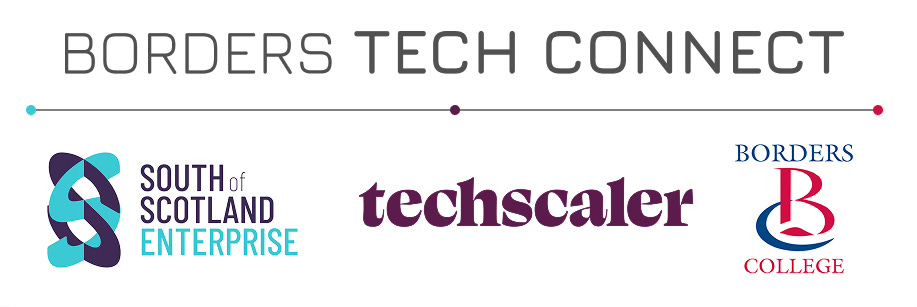When we launched Borders Tech Connect, we knew it had to be more than a networking opportunity. It needed to be a framework — something that could build digital skills, connect education with business, and leave people with practical tools they could use straight away.
That’s why we’ve taken a hybrid approach: each cycle includes a themed meet-up to spark interest and build community, followed by a series of three hands-on workshops to turn ideas into action. It’s a format backed by proven models in other rural regions around the world — from the Highlands of Scotland to rural France and Idaho.
This approach is working. Our first meet-up brought together students, professionals, and businesses in a session on no-code tools and automated workflows. We discussed what it means to “build software” and how modern tools are lowering the barrier to entry for anyone who wants to create a tool, solve a problem, or improve a process.
Now, we’re moving into the workshop phase.
The Workshop Series: Format and Focus
The three-part workshop series is designed by Oli Littlejohn, who specialises in practical no-code solutions for internal tools and business apps.
Workshop 1: Start (Friday, 9 May)
We’ll begin by exploring what no-code means for business — how platforms like Airtable, Zapier, and Stacker can build simple but powerful tools. Rather than entrepreneurial pitches, this is about building internal systems — the kinds of apps and automations that can streamline admin, manage expenses, and connect workflows.
Participants will:
Learn the basics of no-code databases
Build an expenses management app with role-based access
Automate simple tasks like status updates and email alerts
Fast learners will have the option to go further, perhaps building a leave booking app or an inventory tracker.
Workshop 2: Progress (Friday, 30 May)
Here we go deeper. We’ll start applying those foundational skills to real-world business needs. Whether you’re attending as a student, a business representative, or just curious, you’ll begin to sketch out solutions that could apply to your context.
We’ll also introduce topics like governance: how to document, maintain, and scale a no-code tool, and what good practice looks like.
Workshop 3: Finish (Thursday, 5 June)
This is the culmination. We’ll work on business-specific projects, exploring the right tools for the job, how much they’ll cost (now and at scale), and how they might be maintained. By the end of this session, attendees will present demos of their prototypes, and some businesses may walk away with working internal tools ready for use.
Why It Works
This structure — community-focused meet-up followed by practical workshops — isn’t just theoretical. As our research shows, it’s been a powerful driver of:
Business innovation and digital transformation
Graduate retention in rural areas
Startup formation and new partnerships
The key is momentum: events that lead to action, skills that lead to solutions, and collaborations that benefit both students and businesses.
How to Get Involved
If you joined us for the meet-up, thank you! The next step is to sign up for the Start workshop on Friday, 9 May, 10:00–13:00 at Borders College. You’ll need to bring a laptop (we’ll provide wifi and support), and ideally create a free Airtable account beforehand.
You don’t need to be technical. You don’t even need a polished idea. You just need a curiosity for how simple tools can solve real problems.
Workshop 1: No-Code/Low-Code Start
Friday, May 9th 10:00 - 13:00 Borders College
Workshop 2: No-Code/Low-Code Progress
Friday, May 30th 10:00 - 13:00 Borders College
Workshop 3: No-Code/Low-Code Finish
Thursday, June 5th 10:00 - 13:00 Borders College
And if you’re a business with a repetitive task, a messy spreadsheet, or a process that eats up time, we’d love to hear from you.
This is what Borders Tech Connect is all about: connecting people, tools, and ideas — and turning them into action.






